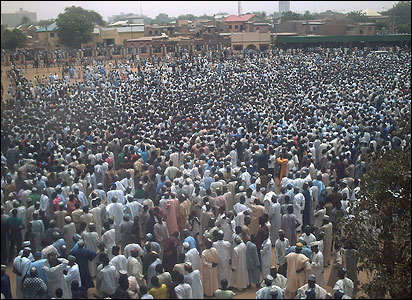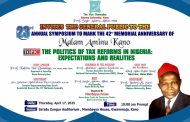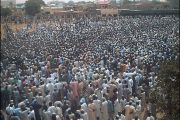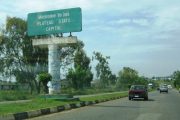By Adagbo Onoja
There has been a major made-in-Jigawa political pronouncement but a pronouncement which goes farther than Jigawa State to the defining issue areas in African politics, with particular reference to ideological and ethical leadership of radical or quasi-radical tendencies, their acquisition/consolidation of power and leadership succession. It is for these reasons that the pronouncement in question is something worth even deeper reflection beyond the shores of Jigawa State in so far as it tracks back to truncation (or is it transformation) of the People’s Redemption Party (PRP), the symbol of the radical tradition in Northern Nigerian politics.
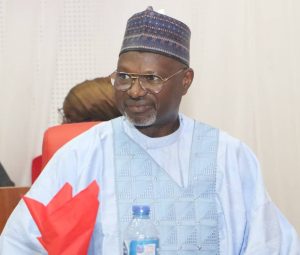
Senator Mallam-Madori who detonated the bomb!
At a rally on April 14th, 2025, Senator Abdulhamid Ahmed Mallamadori declared that, apart from Muhammadu Abubakar Rimi, no other leader of PRP or the radical tradition in Northern Nigeria has performed in office as the incumbent governor of Jigawa State, Umar Namadi. And that he would, therefore, be the flag bearer of the APC in 2027, the APC being where legatees of the NEPU-PRP radicalism is presently concentrated. It is a pronouncement which is reverberating in crucial centres of power and will continue to do so for quite some time. There is a major reason for this.
The reason is that both those who agree as well as those who disagree with the pronouncement have to occupy a higher discursive ground to unmake the statement. In other words, it is not vulnerable to statistical proof. Statistics or facts cannot establish truth because no matter how carefully selected, every set of statistics can be deployed to establish any variant of the truth. Closely related to the pitfalls of facticity is the lack of the alternative agency operating from a higher moral or discursive ground to contest this pronouncement without even more devastating outcomes for the plausible contenders.
However, the pronouncement hollows out a major player in the radical establishment in both Jigawa and the national level. That figure is no other person than Alhaji Sule Lamido, the last PRP governor of Jigawa State and the definitive claimant to the prize Senator Mallamadori has now awarded to Governor Namadi. Sule Lamido is bound to be pained by that pronouncement no end. It is not only him who will be pained though because Mallamadori who made the pronouncement is also the one single individual who made Lamido’s governorship of Jigawa State possible in 2007. If Senator Mallamadori were greedy for power to the extent of not minding hierarchy and seniority, Lamido would never have tested power as Jigawa State governor in 2007. It was morally and ideologically proper that he yielded ground to Lamido.
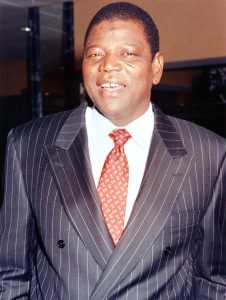
Alhaji Sule Lamido. Was he betrayed?
There is thus something unfortunate in Senator Mallamadori and Lamido not only no longer together politically but also scattered in different political parties. To make it worse, it is not only Mallamadori who left but almost all those we can call the Lamido ‘boys’ of yore. It is even understood that a die-hard Lamido ‘boy’ such as Ali Gantsa is understood to be saying that he (Ali) is more PRP than Lamido.
Those who are not schooled on this matter may be tempted to rush to blame Lamido or allege betrayal of Lamido by his ideological boys. But every betrayal must have a condition of possibility. So, a more persuasive or critical question would be to fix the searchlight on the context which made the betrayal possible, if indeed it was betrayal by Mallamadori and the other ex-Lamido boys, of course starting from Dr. Abubakar Hassan Fulata who served as Lamido’s Special Assistant as Minister of Foreign Affairs; Mallam Nasidi Alli, Lamido’s Personal Assistant as Foreign Affairs Minister; Adagbo Onoja, Lamido’s media aide in Foreign Affairs and others too numerous to mention, all working hard then to oil the Lamido mystique and the possibility of the exceptionalism of that brand in Nigerian politics.
They were substantially successful in this idealism. It was an idealism because, other than IBB, it is difficult to think of any politician in recent Nigerian history to whom his aides and ‘boys’ were committed like Sule Lamido. But while commitment to IBB by members of the IBB boys was explainable in either the military’s ideology of command and hierarchy or the big cake IBB presided over, this was not the case with Lamido. It was something much purer and to the higher value framework which Lamido came to symbolise through a combination of elements, particularly in the aftermath of the split engineered by PDP mandarins between Obasanjo and Muhammadu Abubakar Rimi in 1999.
While there is no debate about it that Sule Lamido is a self-made man, there is also no debate about it that even a self-made man (and woman too) needs others to consolidate. Every leader must have gate keepers who act as a stabilising force because a leader cannot be everywhere at the same time. This is worse in Nigeria where a slave mentality to so-called protocol has transformed into imprisonment of leaders. In this context, the core Lamido boys were a factor. And they were succeeding.
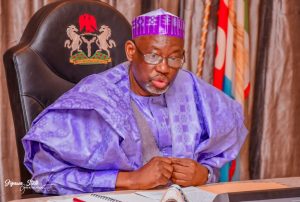
Mallam Umar Namadi, incumbent governor of Jigawa State
Lamido was a fantastic start in 2007. Jigawa was a ghost state when he took over as governor. Anybody who needed to do anything with the state did it from Kano or retreated from Dutse as soon as practicable. By August 2008, a reversal of fortune was on. One plausible explanation was rehabilitation of the bureaucracy by the immediate reassembling of the ministries back in the state capital; a more qualitative peopling of government captured in the story of the Three Aminus: Aminu, the medical doctor SSG; Aminu, the level headed prince, product of ABU, Zaria Political Science and a MNI and Aminu, the Chief of Staff who compensated for his limited intellectual exposure with his vast experience in managing the Government House and capacity to fix things. Lamido’s people-centered rhetoric was also a factor beside the idea of a governor who was not running away from the state, who was superintending the greening of the state and so on and so forth.
However, crucial mistakes were being made, most of them deliberate or calculated. Those ‘mistakes’ produced the kind of pronouncement that Senator Mallamadori has just made. The statement is significant to the extent that Lamido has lost the prize. The prize of the umbrella status under which legatees could regroup and find their bearing in relation to the tradition of politics under reference has been awarded to Governor Umar Namadi. Lamido has lost it because it is not a prize any incumbent would love to share with any other contender, given the value it carries.
This is, therefore, a moment in not just PRP politics but also in Nigerian politics, the PRP being the party of some of Nigeria’s most activist elements, from Chinua Achebe, Wole Soyinka, Eskor Toyo, Bala Usman to a host of the members of that generation, not to talk of the radicals who started it as the first political party in that sense in Northern Nigeria, much, much earlier than the Northern People’s Congress (NPC).
This is the sense in which there are lessens to draw from the pronouncement regarding the question of leadership of platform with a lofty aspirational claim as the PRP as the legatees in question relate to. There is a price to pay for strategic errors in leading others. While no listing is necessary at this point to illustrate the claim, it must be mentioned that actions have implications, some of which take long time to manifest as in this case. Fidelity to balance is required in leadership.
There are the senses in which the Mallamadori pronouncement transcends Jigawa State and demands reflexive engagement by both those who were directly involved and those for whom the Lamido governorship of Jigawa State from 2007 to 2015 was a distant experience. This piece has not blamed anybody yet. It has only stressed the imperative of looking back and thinking through what happened previously, with particular reference to how winners and losers emerge out of every phase of the political.

